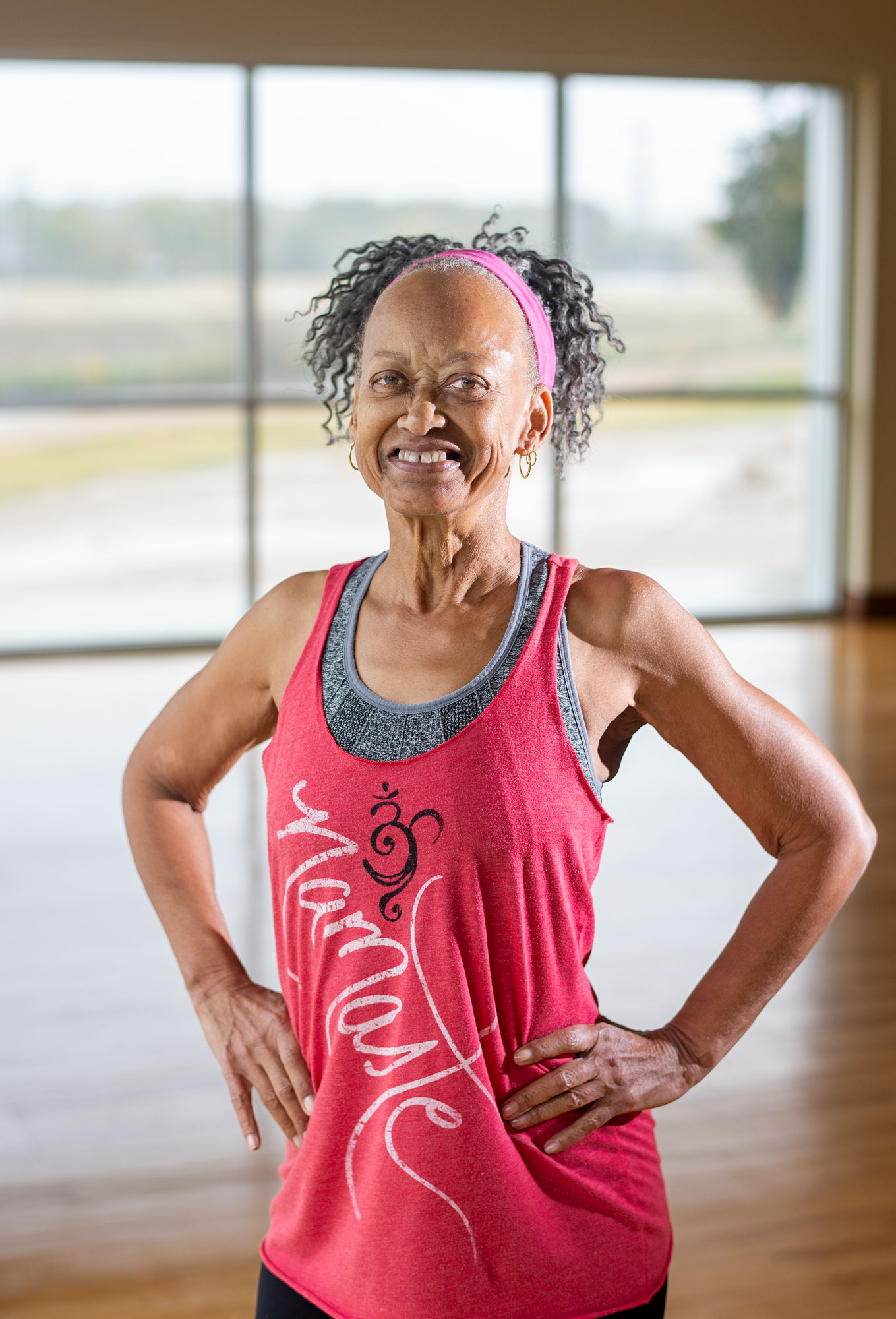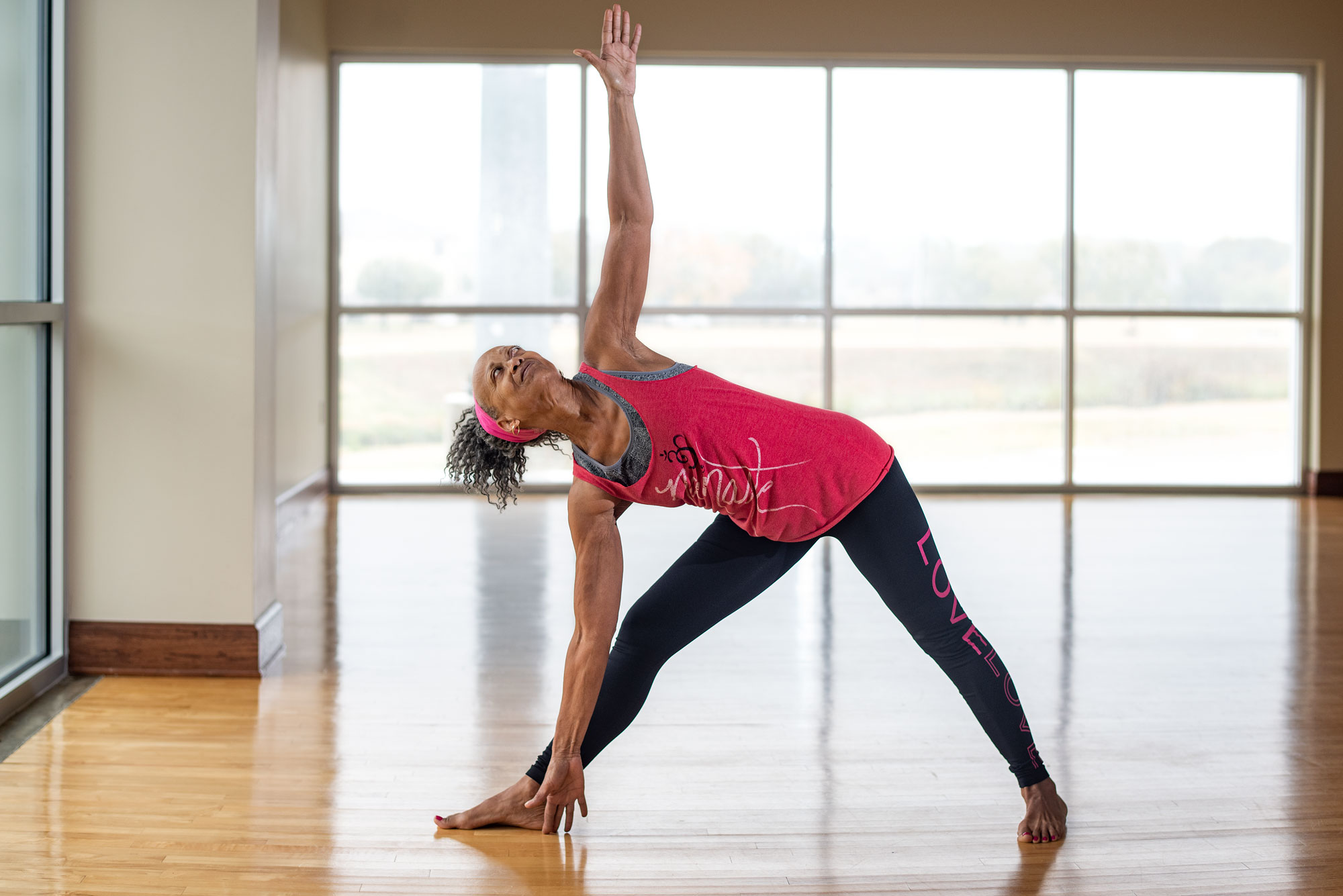Photography by: Ranjani Groth
November 21, 2019
It’s obvious Patricia Ebaire (’98) isn’t the kind of person who likes to take a seat.
Though it’s a bone-chillingly rainy day, and she’s cozily situated inside a La Madeleine
in Fort Worth, all she can think about is the café’s proximity to the Trinity, where
she’s prone to taking hours-long walks around the river.

Patricia Ebaire ('98) is a yoga instructor at CERA in Fort Worth. Though she's always
been active, she doubled down on exercising and eating right after blood work revealed
insulin resistance and inflammation.
“I get my fanny pack — yes, fanny pack — my Walkman, my audiobooks from the library,” she says. “I put my headphones on, and I walk until I decide I’m ready to turn back around. It’s like meditation.”
A New Orleans native, Ebaire moved from the Big Easy to Cowtown-adjacent Benbrook in 1985 with her young daughter in tow. After attending Tarrant County College, she knew she wanted to transfer to a university and figured pursuing a business degree might be her best bet. But then a friend asked, “Why not study something you truly enjoy?”
Ebaire had been a lifelong fitness fanatic — a near necessity considering the barrage of delectable dishes New Orleans is known for — who loved biking, walking, dancing, yoga. When she found she couldn’t shake her friend’s deceptively simple question, she decided to enroll in UNT’s kinesiology program, with a minor in health promotion.
“Everyone was so friendly and my advisors were great,” she says. “Everybody looked at me like I was just another student even though I was old enough to be their parent. They gave me no slack, even when I was out there with them on the volleyball court. They’d say, ‘You got this.’”
Now, more than 20 years after graduating with her bachelor’s, Ebaire has undertaken a whole new learning curve — how to stay fit both inside and out as a Baby Boomer approaching her seventh decade.
The gym enthusiast, who currently teaches yoga and plays Pickleball at CERA (Corporate Employees Recreation Association) in Fort Worth, wrote about her health and fitness journey in the fall 2019 issue of Healthy Aging, opening up about her struggles with weight and eating right. Here, she offers advice to readers about how to stay committed to healthy living — no matter your age.
In your Healthy Aging article, you were very open not only about your weight over the years, but also the challenges you have faced — like menopause and a car accident — that contributed to weight gain. Do you think it’s important for those who promote fitness to be open with people about their own struggles?
Absolutely. One of my fitness instructors said, “I’ve watched you over the past few years as you’ve come here to get healthy and stuck with it — and look at you now. You should tell your story.” So I wrote the article. The most amazing thing is that people write to me and share their own stories. And not just about fitness, but about dreams they have put aside. One of the participants in my yoga class, who is slim and trim and beautiful, told me about her struggles with weight and body image. And I thought, “No way.”
It’s always shocking when you realize that everybody seems to have those stories, even people you look at and think, I’d do anything to be as fit as you.
Yeah, she told me about how much she loves food and what a struggle that has been for her. I’d talked to her so many times — I’ve even been to her home on numerous occasions. And still, I never knew that about her. But because my article shared things that were personal, I thought she felt like she could share her story with me.
There’s an implied superficiality to the idea of “looking good.” But in fitness, there also can be a deeper layer to that concept. I’m wondering what your perspective is on the balance between internal and external aesthetics when it comes to working out and eating right?
It is superficial. When people tell me how good I look and ask me how I did it, I always take the time to tell them that this journey started with lab work that told me what was wrong on the inside. I had gained some weight over the years, but people would always say, “You look good for your age.” But when I got those lab results, I realized the outside has nothing to do with the inside. My blood work showed insulin resistance, inflammation and dehydration, which is a definite risk to organs and cells. No matter how many people tell me how good I look, I know that’s just a benefit of this bigger, more important mission of being healthy on the inside. My heart is strong, my liver is functioning, my kidneys are flushing, my lungs can breathe deeply. That’s what matters.
It sounds like you exercise for you.
I do — I’m determined to stay healthy and fit for as long as possible. You know, my mom is going to be 90 next month, and she tells me, “I’m retired now, I think I’m just going to sit around.” And I’m like, “I’m never going to sit around.” I teach yoga to people who are in their 90s, and they’re still driving without a placard. So there’s no way you can tell me that I have to slow down. You can exercise at any age. There’s no age limit on when you can begin to get healthy.
In fact, I win races against my 12-year-old granddaughter. And she’ll say, “GG (Gorgeous Grandma), that’s because you work out all the time.” And I’m like, “Yeah, but GG is 66.” I think she’s pretty tired of hearing that [laughs].
Patricia Ebaire does an extended triangle pose during her yoga class.
How important is diet vs. exercise?
You see people who exercise all the time, and they’re still overweight. That’s because they haven’t conquered the diet part. And there are plenty of thin people who have high cholesterol. If I had to choose between exercise and diet, it would be diet. Exercise will make you stronger, but diet is going to feed your organs and nourish your body.
You grew up in New Orleans, which like a lot of the South, often defines its culture in terms of food, and more specifically, food that isn’t exactly healthy. So often, we look at food as a reward — I’ve eaten right and exercised all week, so I’ve earned this cheat day. How have you managed to stay on track with healthy eating, and what tips would you give to others who want to change their mentality when it comes to food?
I had that mentality up until a few years ago. I’ve always worked out, so I thought I was doing OK. I’d eat gummi bears until they were coming out of my ears. And I’d think, “Don’t worry about it — just walk an extra hour or do an extra class.” And I’d just devour those processed carbohydrates. Cookies, ice cream, pound cake — whenever I wanted it, I’d eat it. But when I got that lab report, everything changed.
That’s when I started paying particular attention to nutrition, what my body requires to function. I try to keep my carbs below 100 grams per day — I was probably eating over 1,000 grams a day before, easy. I started eating more fruits and vegetables. I use spaghetti squash in lieu of pasta. Get creative. You have to look at the makeup of the food you’re eating and learn to choose healthier options. And moderation is key. That means scooping out two tablespoons of mashed potatoes, not four ounces. Try taking “Patricia Bites,” which is the smallest piece, eat it in many bites and take the time to savor each morsel. That’s moderation.
There are so many approaches to nutrition — macro-based, calorie-based, point-based like WW, intermittent fasting, intuitive eating, etc. Are there ones you have personally found to be more effective?
You have to go with what works for you. One thing I learned at UNT that has always stayed with me is that diet is not the restriction of food — diet is a food plan. People who are restricting entire food groups are not on a diet. We all need a plan for how we eat, and we need all the nutrients.
Global average life expectancy increased by five-and-a-half years between 2000 and 2016. It seems like often, those who have already passed middle age feel like it’s too late to begin a workout regimen. What would you say to people who feel that way and what advice would you give them?
Older people will say, “I’m not worried about how I look.” It’s not about how you look. If you exercise and eat right, you’re going to have a better quality of life. But motivation is a hard thing to give somebody else. When I was a personal trainer, many of my clients were there not because they wanted to be, but because their doctor told them they needed to be. The most important thing is your mindset.
Are there types of exercise that are most effective for those who might be more injury-prone due to age or illness?
There are always modifications, no matter what exercise you do. People will tell me that they can’t get up and down off the floor to do yoga. So maybe chair yoga is the answer for them. Or how about doing gentle yoga on the floor, where you don’t stand up until the session is over? If your wrists hurt in plank, how about if you plank on your elbows instead? You have to be in tune with that person’s body and give them the right information and guidance.
Recently, The New York Times published an article about the importance of subjective age — scientists have found that people who report feeling younger than their chronological age are typically healthier and more psychologically resilient than those who feel older. So my question is: How old do you feel?
I feel 10 [laughs].
That makes sense, considering you’re winning races against 12-year-olds.
Yeah, sometimes I have to tone it way, way down. Like some days, I just want to skip down the street. Before I lost this weight, I didn’t feel nearly as good.
Honestly, I probably feel about 36. I have no aches or pains to remind me of how old I am, so I do anything I want to. The only time I feel my age is when I’m brushing my teeth and look in the mirror and think, “Who is that old woman?” But other than that, I feel like a big ol’ kid.
